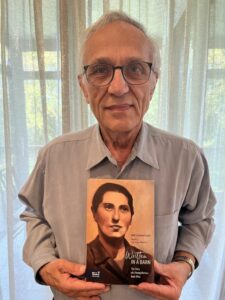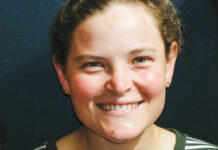When he was a young boy growing up in Washington Heights in New York City, David Engles’ parents did not often discuss their experiences during the Holocaust.

His mother, Ruth Leimenzon Engles, died when Engles was 9. His father, Lazar Engles, rarely talked about his time in the Vilna and Lida ghettos in Lithuania and Belarus. Engles did not look more deeply into their stories until many years later.
But at 77, the former mathematics professor and actuary has dedicated his retirement to translating and publishing his parents’ memoirs. His parents wrote two books about their experiences, with their Yiddish titles translating to “In Ghettos and Forests” by his father and “Written in a Barn: the Diary of a Young Woman from Vilna” by his mother. These books were inaccessible to an English-speaking audience, but through Engles’ work, the latter is now available in English through Yad Vashem’s online store.
“We spoke Yiddish at home, but I was never formally educated in it,” Engles recalled. “But my children don’t read Yiddish. … It was important to me to pass on what happened to my parents to the next generation.”
Engles is currently working on translating “In Ghettos and Forests,” and he said he hopes to eventually publish Hebrew translations of both works. He noted that his children, grandchildren and great-grandchildren live in Israel and do not often read English texts, and he wants them to be able to read their ancestors’ accounts as well.
Engles himself lives in Pikesville with his wife, Eva, whose parents were also Holocaust survivors from Czechoslovakia. The two attend Beth Tfiloh Congregation. The couple made aliyah to Israel two years ago, and now split their time between there and Maryland.
Neither of Engles’ parents were imprisoned in concentration camps during the Holocaust, he noted. Lazar Engles escaped from Nazi-occupied Vilna in 1941, but was unable to save his then-wife and two young children. He made another daring escape from a death march in Lida the following year, joining the Bielski partisan camp as a chef. The general public might know the camp best from its portrayal in the 2008 film “Defiance.”
Like the title of her memoir might suggest, Engles’ mother, Ruth Leimenzon Engles, hid from the Nazis in a barn near Vilna. Her former boss’s wife, a Christian woman, helped her escape from the Vilna ghetto mere days before its liquidation. Another Christian woman hid her for ten months in her barn until the Soviet liberation, and she wrote her diary under constant fear of discovery.
Translating his mother’s memoirs was particularly meaningful for Engles, who lost her at a young age.
“I was only a little boy when she passed away, and I was away at summer camp when it happened,” Engles said. “I never really got to know my mother until I translated her diary. … I got to find out what an extraordinary woman she was.”
He said that his mother’s diary is to his knowledge the only surviving account of the Vilna ghetto written by an adult woman — the only other comprehensive account of the ghetto, the recently translated “I Must Tell” by Maria Rolnikaite, was written when the author was a young girl.
Since he first started translating his parents’ memoirs, Engles has traveled all over the country to give presentations about their stories. He is often joined by his wife, who speaks of her own parents’ experiences in Auschwitz and Nazi forced labor camps.
Engles added that his and his wife’s parents have similar stories, in that they were all Holocaust survivors who remarried after losing their spouses.
“Today, our family has grown to over 40 individuals — children, grandchildren, great-grandchildren and great-great-grandchildren. And every single one of them is an observant Jew,” Eva Engles says as part of these presentations. “And all the millions of Jews living today, who are descendants from the Holocaust survivors, are a testament to the statement, that they are all victors. Whenever the world tries to eliminate us, we come back even stronger.”
David Engles said that it is important for young Jewish people to learn about their history and about the people who sacrificed everything to get them to where they are today, especially with the current situation in Israel.
“It’s very sad to me when I look at younger, and sometimes even older, Jews who know so little about their history and traditions,” he said. “It’s a very small part of our history, but by sharing my parents’ experiences, I hope that it will trigger them to learn more.”







